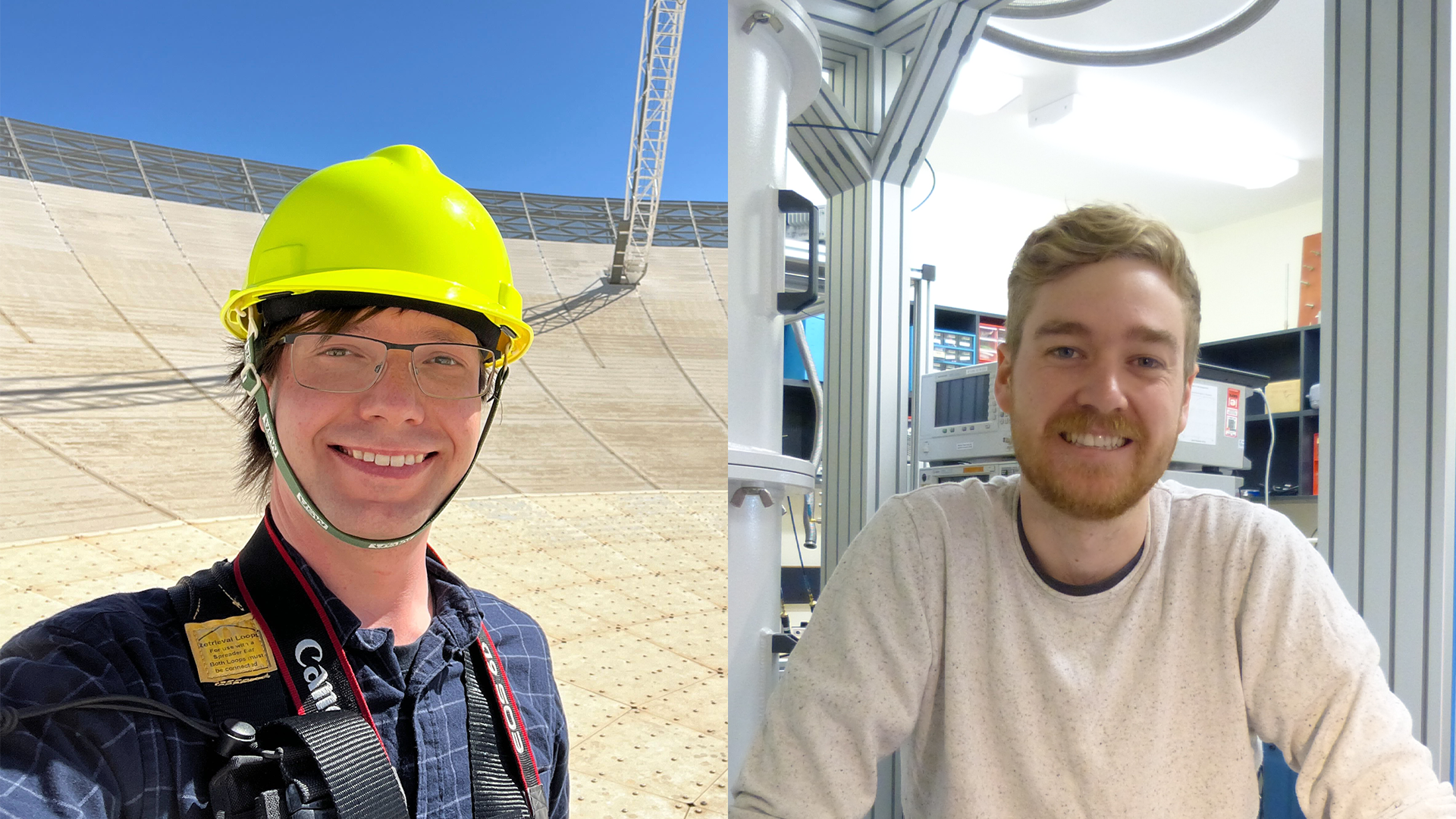Swinburne physicists enjoy early career funding success

Dr Marcus Lower (left) and Dr Benjamin McAllister (right) were awarded DECRA fellowships
In summary
Two Swinburne researchers have received Discovery Early Career Researcher Awards (DECRA) from the Australian Research Council
The funded projects will focus on detecting dark matter and discovering the origins of fast radio bursts
The DECRA scheme supports promising early career researchers to develop in supportive environments
Swinburne University of Technology has been awarded almost $1 million in funding for two successful Australian Research Council (ARC) Discovery Early Career Researcher Awards (DECRA).
Two talented Swinburne researchers, Dr Marcus Lower and Dr Benjamin McAllister, have been honoured with the awards this year and will commence their research fellowships in 2025.
The DECRA scheme supports early career researchers to focus on their area of expertise for three years.
Professor Karen Hapgood, Swinburne’s Deputy Vice-Chancellor Research, congratulated the recipients.
“These successful projects highlight Swinburne's leadership in space research. We take immense pride in our early career researchers and are thrilled by the ARC’s recognition of two of our promising physicists,” Professor Hapgood said.
The origins of fast radio bursts
Dr Marcus Lower aims to discover the origins of fast radio bursts and how they are affected by their local environments.
Fast radio bursts are intense bursts of radio waves that can be detected from half-way across the Universe, but the vast distances these bursts travel make detailed studies of their exact origins extremely difficult.
However, by studying galactic analogues – young, highly magnetised neutron stars within the Milky Way that display similar behaviour – researchers can gain insights into how fast radio bursts work.
“I am thrilled to be returning to Swinburne with a prestigious DECRA fellowship. Along with resolving how and where fast radio bursts originate, this project will help secure Australia’s leading position in radio astronomy and maximise our return on investment in the SKA mega-science facility.” Dr Lower said.
Dr Lower was awarded $471,331 for the project and will join Swinburne’s Centre for Astrophysics and Supercomputing.
Detecting the nature of dark matter
Dr Benjamin McAllister’s research focuses on dark matter detection and quantum sensing. He aims to develop new experimental searches and new technologies in parallel. The potential impacts of dark matter discovery are difficult to overstate and future quantum technologies are expected to both revolutionise dark matter experiments, and find applications in next generation computing, communication, sensing and other fields.
Dr McAllister hopes his research will enhance Australia’s ongoing efforts in dark matter detection.
“I feel incredibly honored to have been awarded a DECRA fellowship as an early career researcher,” he said.
“The funding from DECRA will help bring dark matter discovery closer to reality and I’m excited to see how we can work towards extending dark matter detectors into new regimes and developing new technologies with applications beyond fundamental physics.”
Dr McAllister was awarded $488,691 for the project and is based at Swinburne’s Centre for Astrophysics and Supercomputing.
-
Media Enquiries
Related articles
-

- Astronomy
- Technology
- Health
- Science
- University
- Sustainability
- Engineering
Swinburne highly cited researchers reach the top in 12 fields
Ten Swinburne academics have been named on the Highly Cited Researchers 2025 list, released by Clarivate
Tuesday 02 December 2025 -

- University
Over 550 students don caps and gowns to graduate from Children’s University Swinburne
Over 550 students from 34 schools have graduated from Children’s University Swinburne, celebrating over 45,000 hours of learning beyond the classroom this year.
Wednesday 03 December 2025 -

- Technology
- Health
- Science
- University
$1.2m ARC funding to boost national X-ray spectroscopy capability through Swinburne and QUT partnership
Swinburne has secured $1.2 million in the latest Australian Research Council Linkage Infrastructure, Equipment and Facilities scheme round
Tuesday 02 December 2025 -

- University
Swinburne researchers shine at the 2025 Media and External Communications Recognition Awards
Swinburne’s 2025 Media and External Communications Recognition Awards have recognised our academics for notable media and social media outreach.
Thursday 04 December 2025 -

- University
Update on Union Street Windsor
An update from Swinburne University of Technology on the property at 131–133 Union Street, Windsor.
Friday 07 November 2025

